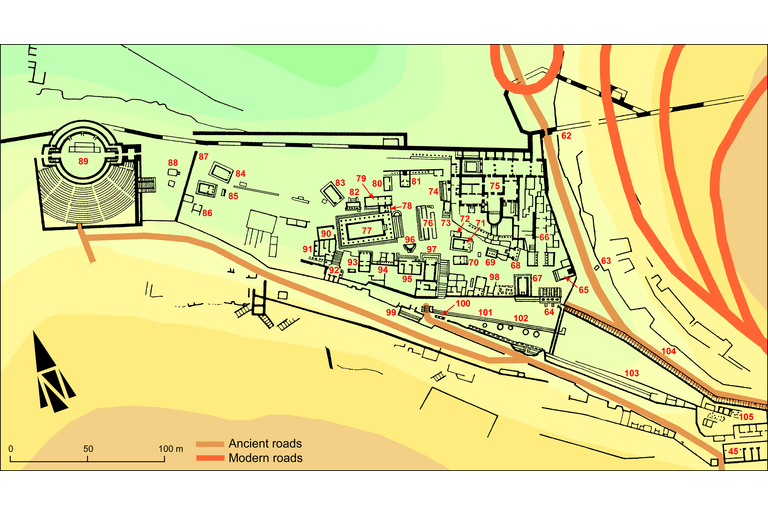Tithe for Apollo
IGCyr104200
Trismegistos ID: 738564
Source Description
Support
White marble rectangular base, broken off at left, re-used upside down on left face for IRCyr C.332 (0.53; 0.18;0.46).
Layout
Inscribed in two lines on the upper part of front face.
Letters
0.022 to 0.03; deeply cut letters without serifs, dotted theta, kappa with large oblique bars, slanting mu and sigma, open and not too small omega.
Place of Origin
Findspot.
Date
Probably fourth century B.C. (lettering)
Findspot
Found in 1934 at Cyrene pleiades; HGL : Sanctuary of Apollo , in the Eastern part of the Terrace of the Fountain .
Later recorded Location
Seen in 1960 by D. Morelli (see commentary).
Last recorded Location
Seen by C. Dobias-Lalou several times between 1983 and 2004 in the Sanctuary of Apollo , East of the Grotto of the Priests.
Text constituted from
Transcription from stone (CDL).
Bibliography
MorelliSECir Oliverio, G., Pugliese-Carratelli, G., Morelli, D., 1961-1962, Supplemento Epigrafico Cirenaico, Annuario della Scuola Archeologica di Atene e delle Missioni Italiane in Oriente (ASAA)39-40 (= n.s. 23-24), 219-375 - see in bibliography , 248 a (ph.).
Apparatus
1 [...] άνθης : SECir Oliverio, G., Pugliese-Carratelli, G., Morelli, D., 1961-1962, Supplemento Epigrafico Cirenaico, Annuario della Scuola Archeologica di Atene e delle Missioni Italiane in Oriente (ASAA)39-40 (= n.s. 23-24), 219-375 - see in bibliography [---] άνθης : Fraser-Matthews, 1987 Fraser, P.M., Matthews, E. (eds.), 1987, Lexicon of Greek Personal Names, I: The Aegean Islands, Cyprus, Cyrenaica, Oxford - see in bibliography [Πολι]άνθης
French translation
[---] anthès fils de Kleudamos (a consacré ce monument) à Apollon au titre de la dîme.
English translation
[---] anthes son of Kleudamos (dedicated this monument) to Apollo as a tithe.
Italian translation
[---] anthes figlio di Kleudamos (ha dedicato questo monumento) ad Apollo come decima.
Commentary
The name of the dedicant was restored as Πολιάνθης in Fraser-Matthews, 1987 Fraser, P.M., Matthews, E. (eds.), 1987, Lexicon of Greek Personal Names, I: The Aegean Islands, Cyprus, Cyrenaica, Oxford - see in bibliography by Fraser himself or on Reynolds' proposal, presumably because of its numerous occurrences in Cyrenaean omomastics. However Dobias-Lalou thinks that only three letters are missing. Although that restoration, including an iota, is not impossible, the name Δαμάνθης in also known in Cyrenaica and would fit the gap. So it seems better to remain cautious about the lost letters.
Morelli's indication about the place of observation is very vague («Piazzale, a destra del Santuario di Apollo, guardando verso lo Strategeion»). However it allows to think that the stone has not been moved between 1960 and 1983. We thus suppose that he saw it in the same area where it still lay in 2004. About the excavations of that area we now take advantage of the ancient reports published by Luni, 2014 Luni, M., 2014, Attività di Carlo Anti, Luigi Pernier e Gaspare Oliverio (1923-1938), in M. Luni (ed.), La scoperta di Cirene. Un secolo di scavi, 1913-2013, Monografie di archeologia libica37, Cirene Atene d'Africa8, Roma, 123-156 - see in bibliography , p. 141.
Creative Commons Attributions-NonCommercial 4.0 International License.
All citation, reuse or distribution of this work must contain a link back to DOI: http://doi.org/10.6092/UNIBO/IGCYRGVCYR and the filename (IGCyr000000 or GVCyr000), as well as the year of consultation.
